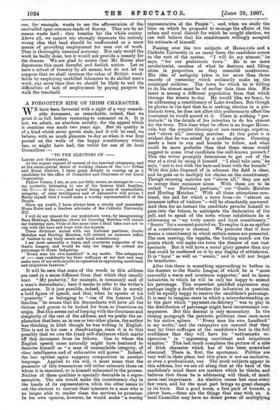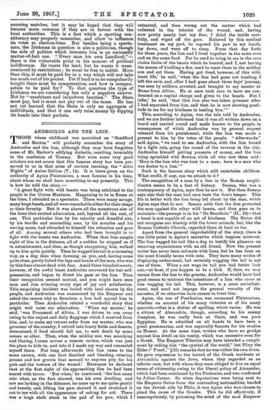A FORGOTTEN SIDE OF IRISH CHARACTER.
WE have been favoured with a sight of a very remark- able document, so remarkable, indeed, that we print it in full before venturing to comment on it. It is not, we admit, an absolute novelty, for the appeal which it contains was made two years ago. But its quality is of a kind which never grows stale, and it will be read, we believe, with as much pleasure to-day as when it was first posted on the walls of the happy constituency which has, or might have bad, the writer for one of its local Councillors :--
• "TO THE ELECTORS OF —.
LADIES AND GENTLEMEN, At the urgent request of several of the heaviest ratepayers, and it the extra special desire of working classes of the — Urban. and Rural District, I have great delight in coming up as a candidate for the office of Councillor and Chairman of our Local Corporation. , Fellow Voters, I am, as you are fully aware, no stranger to my posterity belonging to one of the famous Irish families, the 0*— of the —, and myself being a man of unassailable integrity, of clear intelligence and of exhaustive will power, I flatter myself that I would make a worthy representative of the
People.
. Since my youth, I have always been a sturdy, and consistent Home Ruler and a fearless advocate of the Catholic University Bill.
I will do my utmost for our prehistoric town, by inaugurating Race Meetings, Regattas, above all Coursing Matches wiU insure my fostering care, while at the same time I shall take care not to run with the hare and hunt with the hounds.
These divisions united with our National pastimes, Gaelic Matches and Hurling Matches, will attract an immense influx of visitors to my truly scenic and loyal constituency.
I am most assuredly a warm and courteous supporter of the Gaelic League, and would be only too happy to extend my patronage to Home Industries. 'Every man his own Landlord' is my motto. The ratepayers of --- may confidently lay their suffrages at my feet and may make sure of my enthusiastic co-operation in oppressing exorbitant and „iniquitous taxation."
' It will be seen that some of the words in this address are used in a sense different from that which they usually bear.' "My posterity," for example, is commonly said of aMan's descendants; here it seems to refer to the writer's ancestors. It is just possible, indeed, that this is merely a bold figure of speech, and that, when he speaks of his " posterity " as belonging' to "one of the famous Irish families,' he means that his descendants will have all the Virtues and graces to be looked for from so illustrious an origin. But this seems out of keeping with the directness and dimplicity of the rest of the address, and we prefer the ex- planation that here,'as in one or two other places, the author Was.thinking in Irish though he was writing in English. This is not in his case a disadvantage, since it is to this possibly that we owe the freak self-disclosure which marks off this document from its fellows. ' One to whom the English speech came naturally might have hesitated to describe himself as "a man of unassailable integrity, of clear intelligence and of exhaustive will power.' Indeed, the last epithet again suggests composition in another language. Applied to the will, it must mean that the possessor of this tremendous will either exhausts those on whom it is exercised, or is himself exhausted in the process. Neither of these qualities is specially desirable in a repro-. sentative, The one would make the constituency clay in the hands Of its representative, while the other seems to ask the electors to entrust their interests to a man who is no longer able to render them the services he promises. In his own opinion, however, he would make "a worthy representative 'of the People " ; and, when we study the lines on which he proposed to manage the affairs of the urban and rural district for which he sought election, we can well believe that his constituents willingly accepted
his estimate of himself. -
Bullring over the two subjects of Home-rule and a Catholic University in as many lines, the candidate comet; to the root of the matter. "I will do my utmost," he says, "for our prehistoric town." He is no mere revolutionist, careless of what he destroys and liking cities in proportion as they resemble mailrooms. His idea of antiquity takes in far more ths:ti . those records of yesterday which ordinarily make up the municipal archives. The . town. for which he is willing to do his utmost must be of earlier date than this. His heart is among a different population from that which throngs the streets to-day. Be would like, we fancy, to be addressing a constituency of Lake-dwellers. But thoegh. he glories in the fact that he is seeking election in a pre- historia town, he does not allow this preference to affect the treatment he would accord t it. There is nothing "pre- historic" in the details of his intention to do his utmost for the town. This time what he offers is no longer Hanle- rule, but the simpler blessings of race meetings, regattas, and "above all," coursing matches. At this point it is evident that he was seized by a sudden alarm. Coursing needs a hare to run and hounds to follow, and what could be more probable than that these terms would suggest to some rival candidate the well-known proverb ? This the writer promptly determines to get out of the way of a rival by using it himself. "I shall take care," he says, "not to run with the hare and hunt with the hounds." With this' joke disposed of in advance the field is clear, and he goes on to multiply his claims on the constituency. Though coursing matches are "above all," they are not to occupy their eminence alone. With them are to be united "our National pastimes," our "Gaelic Matches and Hurling Matches." With all these attractions com- bined, the end for which a town lives—to "attract an immense influx of visitors "—will be abundantly answered. And then for an instant the candidate permits himself to gaze into the future, to anticipate the declaration of the poll, and to speak of the town whose inhabitants be is addressing as "my truly scenic and loyal constituency." "Scenic" for a moment puzzled us. To employ it as an epithet of a constituency is unusual. We presume that it here means a constituency in which certain scenes are presented. The race meeting, the regatta, the hurling match are the points which will make the town the theatre- a one vast spectacle. But it will have a moral glory greater than any that could be conferred on it by any display of athleticism. It is "loyal" as well as "scenic," and it will not forget its benefactor.
After this there is something approaching. to bathos in the descent to the Gaelic League, of which he is "most assuredly a warm and courteous supporter," and to. home industries, to which he will be only too happy to extend his patronage. This somewhat qualified expression may, perhaps imply a doubt whether the industries in question will be equally happy to receive the candidate's patronage.. It is easy to imagine cases in which a misunderstanding as to the part which " payment-On-delivery " was to play in the distribution of patronage might have inconvenient con- sequences. But this descent is only momentary. In the closing paragraph the patriotic politician rises once more to his native sphere. "'Every man his own Landlord.' is my motto," and the ratepayers are assured that they may lay their suffrages at the candidate's feet in the full confideece that they will. have his. " enthesiastic co- operation" in "oppressing exorbitant and iniquitous taxation." This last touch completes the picture of a side of Irish character which has of late been somewhat obscured. There is, first, the sportsman. Politics are very well in their place, but this place is not an exclusive, or even a predominant, one. The stock subjecti appear in this address, but we see all along that at the. back of the candidate's mind there are matters which he .thinks, and believes that those he is addressing will think;of much more real importance.'- An election comes but once every Sew years, and for the most part brings no great changes its train. But a good horse, a fast pack of hounds, a 'clever hare,—these are the things that stay with us. A. llocal Councillor may have no- direct power-of multiplying coursing matches, but it may be hoped that they will become more common if they are in favour with the local authorities. This is a fact 'which a sporting con- stituency may properly remember, and allow to influence its votes at election-time. But besides being a sports- man, the Irishman in question is also a politician, though the side of politics which interests him is an eminently matter-of-fact one. 4` Every man his own Landlord,"— there is the vulnerable point in his armour of political indifference. He wants the land, but he wants it unen- cumbered by restrictions ; he must be free to sublet. More than this, it must be paid for in a way which will not take too mach out of his pocket. Yet if land is to be compulsorily bought there must be compensation, and how is compen- sation to be paid for ? To that question the type of Irishman we are considering has only a negative answer. Not by "exorbitant and iniquitous taxation." The State must pay, but it must not pay out of the taxes. He has not yet learned that the State is only an aggregate of individuals, and that it can only raise money by dipping its hands into their pockets.

















































 Previous page
Previous page